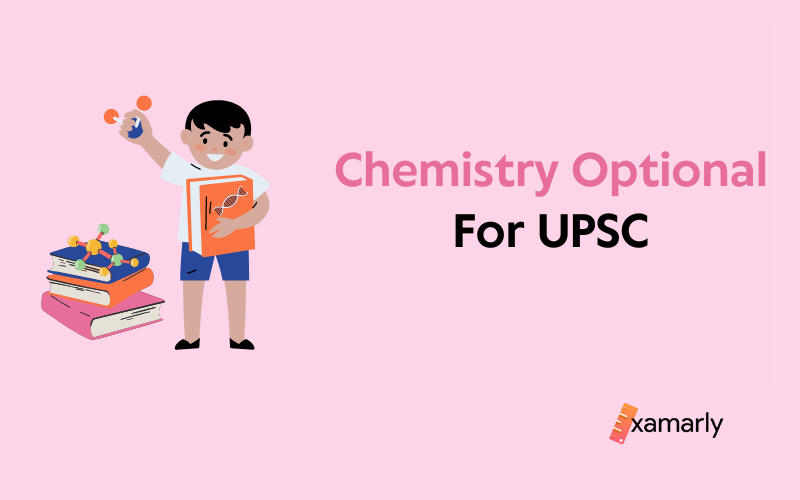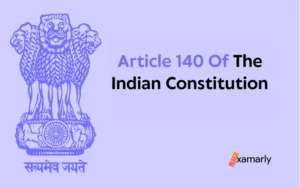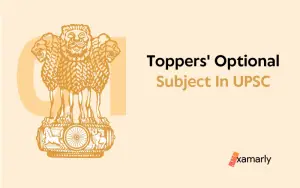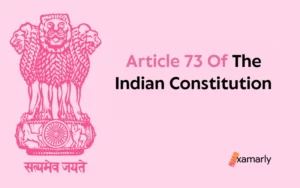If you are in the science group and are planning to write the UPSC exam, then you should consider taking up chemistry optional. This subject has less subjectivity and is very precise. Therefore, students who select Chemistry optional for UPSC can expect to score the highest.
Chemistry optional is accessible to candidates who previously work as chemists, physicians, chemical engineers, and other allied healthcare professionals. To make your preparation more effective and efficient, we are providing a basic understanding of chemistry as optional in UPSC, its success rate in recent years, the advantages and disadvantages of choosing this as optional, recommended books by toppers, and its preparation strategy.
How Many Take Chemistry Optional?
In contrast to electives like public administration or geography, chemistry does not have a very high elective enrollment rate. But typically, between 70 and 120 people choose to participate in this optional. According to the most recent data available, 124 individuals took chemistry in 2016, however, only 7 of them passed.
Success Rate
The success rates of applicants having chemistry as an optional subject in past years are displayed in the table below. However, you can see the success rate of chemistry optional is increasing in these years.
| Year | No. of candidates appeared | No. of candidates cleared |
| 2015 | 92 | 11 |
| 2010 | 107 | 7 |
| 2002 | 133 | 7 |
| 2013 | 85 | 6 |
| 2005 | 84 | 4 |
| 2012 | 104 | 11 |
| 2007 | 110 | 9 |
| 2016 | 124 | 7 |
| 2006 | 89 | 5 |
| 2004 | 109 | 0 |
| 2011 | 123 | 11 |
| 2014 | 98 | 7 |
| 2002 | 75 | 2 |
| 2009 | 109 | 9 |
| 2008 | 124 | 7 |
UPSC Topper With Chemistry Optional
In 2002, Ankur Garg, having chemistry as one of his optional, secured 1st rank in the UPSC exam. The below table shows the lists of toppers.
| Name | Year | Rank |
| Ankur Garg | 2002 | 1 |
| Pulkit Garg | 2015 | 27 |
| Deepesh Kedia | 2017 | 221 |
| Rahul Gupta | 2016 | 182 |
| Church Gaur | 2015 | 96 |
Pros And Cons Of Chemistry As Optional In UPSC
Pros
- Static and precise: Since chemistry is a precise discipline as compared to other subjects of humanities or social sciences, it is regarded as a high-scoring subject. This increases the predictability of the marking.
- Portions Scoring subject: Because there is plenty of opportunity for equations and illustrations, chemistry is a subject that scores well. In this paper, there are additional numerical questions that, if answered correctly, can get you the maximum points.
- Overlap with GS papers: There is a slight overlap with the GS syllabus, especially regarding issues like the environment, climate change, and emerging scientific technologies like nanotechnology and fiber optics, giving candidates an extra edge.
- Less Competition: Due to less number of candidates in this optional, there is quite low competition compared to other subjects.
Cons
Although there are several pros of Chemistry optional for UPSC, there are also several cons to opting for it. Some are mentioned below-
- Need for core scientific knowledge: Candidates need to be from a science background or have exceptional knowledge of science for choosing this option.
- Possess a sincere desire to learn about chemistry: You must truly enjoy studying this subject; else, your preparation period will be cut short by boredom.
- At least six months will be needed to finish the syllabus: The whole syllabus will need more than 6 months to complete, which is a drawback for the candidates, who have limited preparation time.
Syllabus Of Chemistry Optional For UPSC
Chemistry paper falls into three categories:
- Physical Chemistry: Physical chemists conduct extensive research on a variety of subjects, including the rates of reactions (kinetics), the interaction of light and matter (spectroscopy), the arrangement of electrons in atoms and molecules (quantum mechanics), and the stability and reactivity of various substances and processes (thermodynamics).
- Organic Chemistry: The study of the structure, characteristics, composition, organic reactions, mechanism of reaction, and production of carbon-containing compounds is known as organic chemistry. Carbon and hydrogen make up the majority of organic compounds, although they can also contain a variety of additional elements (e.g., sulphur, nitrogen, silicon, oxygen, phosphorus, and halogens).
- Inorganic Chemistry: The characteristics and behavior of inorganic substances, such as minerals, metals, and organometallic compounds, are the focus of inorganic chemistry.
An overview of the syllabus of this paper is mentioned below:
- Physical chemistry and a portion of inorganic chemistry are covered in the first paper. These topics cover topics such as atomic structure, chemical bonding, and thermodynamics. This section also includes numerical from atomic structure and gaseous and solid states, as well as coordination chemistry. These topics comprise most of the syllabus for UPSC chemistry and most of them can be covered through NCERT books.
- Chemical bonding contains some difficult topics, such as the mathematical parts of valence bond theory and molecular orbital theory, which is the most significant topic in this paper. Because this is a highly broad topic that requires advanced mathematics, you need to stick to the syllabus and go through the previous paper questions.
- From Thermodynamics and Chemical Kinetics, only basic questions were asked. so you can prepare it from any basic books. Electrochemistry and photochemistry are also important sections. there were many questions asked about this topic.
- Paper II consists of organic chemistry and spectroscopy. With some extra practice and clarity of basic concepts, you can score high in this vital section. It dealt with Covalent Bonding and Reaction Mechanisms, which are important sections of this paper. it’s very important to understand these topics because it relates to many other topics of this subject.
- Additionally, many questions have been asked about Polymers and Synthetic Uses of Reagents, Photochemistry, and Spectroscopy. Therefore for better scoring, you need to solve their questions specifically.
Check out the linked article to know about the Chemistry Optional Syllabus For UPSC in a detailed manner.
Chemistry optional strategy
The syllabus for the UPSC exam outlines the different areas of study that you should focus on. Knowing the syllabus for chemistry and the exam pattern is the most crucial preparatory stage for the chemistry optional. Keep a copy of the UPSC chemistry optional curriculum nearby at all times.
Here we discuss the exam preparation strategy of both the optional papers one by one, for better clarity:
Chemistry paper I strategy
- Physical Chemistry and Inorganic Chemistry are the two main subfields of Paper 1 of Chemistry. These two branches are easy to score on as well. Sections A and B of Paper 1’s Section A are not explicitly defined in the syllabus. However, Section A of the question paper for the main examination always has three questions, one of which must be from Physical Chemistry. Usually, only one question from inorganic chemistry is asked.
- Atomic structure and chemical bonding are the first two conceptual topics, and they should be prepared using established sources. Although you may also receive direct questions from these parts, their significance will be felt throughout the majority of the course.
- You must prepare independently for numerical and theoretical issues in Solid State Chemistry. The best part about Paper 1’s newest section, Gaseous State, is that it has a straightforward mathematical foundation. It will undoubtedly be rewarding if you prepare it properly from a reliable book.
- Be careful to keep a chemistry orientation in thermodynamics. Engineers frequently handle questions in an overly mathematical manner. However, you must also consider heat change when studying chemistry. Your derivations must be standard, or as described in works like S. Glasstone’s, to receive a good grade. Based on historical tendencies, you can be somewhat picky in the thermodynamics part.
- Statistical thermodynamics is a recently added component that scores quite well. In addition to being proficient with numerical issues, the section on Phase Equilibria requires strong writing skills. In electrochemistry, numerical problems should be prioritized because they are relatively simple and contribute to the paper score.
- Once again, numerical-based fields include Chemical Kinetics and Photochemistry. So, the key to handling these portions properly will be practice. Photochemistry is very significant; every year, it awards numerical problems worth at least 30 marks.
- Coordination chemistry is a broad subject that is covered by almost two complete questions. It is recommended that students read this section in its entirety. Bio-Inorganic Chemistry calls for a solid material collection. The book Plant Molecular Biology and Biochemistry by Bob Buchanan will be helpful.
- As long as you have thoroughly covered the earlier sections, the remaining topics in Paper 1 can be covered selectively.
Chemistry Paper II strategy
- The entire second paper is devoted to organic chemistry. It is a highly scoring paper under the new syllabus because of several criteria, including its emphasis on reaction mechanisms, mathematical orientation, straightforward factual queries, and the objective nature of the majority of the questions.
- The following elements must be considered by the student as they are preparing for Paper 2:
- Your strategy must be straightforward, conventional, and to the point. You must rigorously
- Practice the numerical problems and possess a thorough understanding of reaction mechanisms because the questions are becoming more factual and straightforward.
- In the part on pericyclic reactions, pictures must take precedence over theoretical justification, and name reactions must be carefully practiced from reliable sources.
- It is vital to know how orbitals are oriented and how molecular orbital diagrams work.
- Additionally, in the re-agent portion, your strategy must be entirely accurate.
Chemistry Optional Books
- An Introduction to Electrochemistry – Samuel Glasstone
- Inorganic Chemistry – James Huheey
- Spectroscopy of Organic Compounds – PS Kalsi
- Physical Chemistry – KL Kapoor
- Principles of Physical Chemistry – Puri, Sharma & Pathania
- Organic Chemistry – Clayden
- Advanced inorganic chemistry – Cotton, Wilkinson, Murillo & Bochmann
Link Of Relatable Articles
| Physics Optional For UPSC |
| Maths Optional For UPSC |
| Botany Optional For UPSC |
| Civil Engineering Optional For UPSC |
| Mechanical Engineering Optional For UPSC CSE |
| Electrical Engineering Optional UPSC |
Conclusion
If you have a background in chemistry or you are curious about the subject, you might consider opting for the chemistry optional paper. The subject takes approximately 6-8 months to cover, and there is little overlap between it and the general studies paper.
However, Chemistry is not the most popular optional subject, but it is one of the most highly scoring subjects. It consists of two papers, each carrying 250 marks. The UPSC mains exam is a three-hour exam. Chemistry also has less competition, and the syllabus has relatively stable content. This makes it an ideal option for candidates with some prior knowledge of chemistry.
FAQs
Who Got The Highest Marks In Chemistry Optional In UPSC?
In 2002, Ankur Garg, having chemistry as optional, secured 1st rank in the UPSC exam.
What Is The Level Of Chemistry At UPSC?
The syllabus is appropriate for students who have studied chemistry at the graduate level. Chemistry for UPSC is a highly specialized subject. It needs a high level of skill, hence early preparation is advised. For practice, candidates should answer questions from UPSC question banks from prior years as well as attempt mock tests. Aspirants should also be aware of the UPSC Chemistry Preparation Strategy. Further, they may do so by reading the article that is attached. They may succeed in the UPSC exam and earn high marks if they did this.
Is Chemistry Optional Good For UPSC?
Chemistry is a core science subject and is best suited for candidates with a science background.
Only individuals with a science background at the graduate level should pursue chemistry because it is a core science topic. Choose Chemistry as an optional subject for the UPSC main test if you are confident in your knowledge of the issue.
How To Prepare Chemistry Optional UPSC?
For the IAS mains test, the UPSC offers chemistry as one of the optional subjects. Only individuals with a science background at the graduate level should take it because it is a core science subject. Choose Chemistry as optional subject in UPSC mains exam if you are confident in your knowledge of the subject. General Tips to prepare this paper is as follows:
1. Read the UPSC Chemistry optional Syllabus carefully
2. Refer best reference books to prepare.
3. Make a study schedule and follow it wisely.
4. Chemistry optional notes for UPSC preparation are required. As these notes will help you during the time of revision.
5. Solve Previous Question Papers on this core science subject for exam preparation.
6. Practice mock tests as well to get well-versed in this paper.
Can Prelim Exam And Mains Exam Be Prepared Simultaneously?
Yes, both the prelim exam and the UPSC mains exam should be prepared in parallel. However, when the former exam is approaching then one should shift their focus entirely toward the preliminary exam.
Is It Essential To Have Chemistry Optional UPSC Notes?
Yes, to ace your IAS exam it is essential to have Chemistry notes for UPSC optional preparation. As these notes will be helpful during revision and you don’t have to go through the number of study materials and books to revise the entire syllabus.






